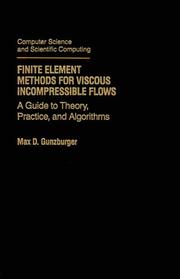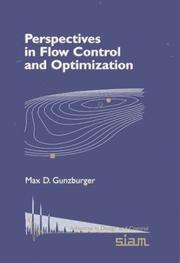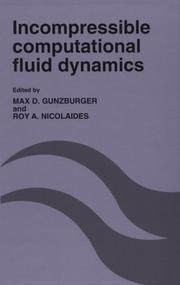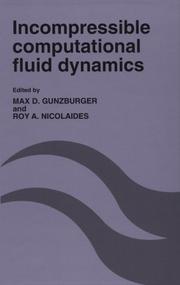| Listing 1 - 10 of 15 | << page >> |
Sort by
|

ISBN: 0123073502 0323139825 Year: 1989 Publisher: Boston (Mass.) : Academic press,
Abstract | Keywords | Export | Availability | Bookmark
 Loading...
Loading...Choose an application
- Reference Manager
- EndNote
- RefWorks (Direct export to RefWorks)
Finite element method --- Viscous flow --- Méthode des éléments finis --- Ecoulement visqueux --- Finite element method. --- Viscous flow. --- Méthode des éléments finis

ISBN: 089871527X 9780898715279 Year: 2003 Publisher: Philadelphia (Pa.): Society for industrial and applied mathematics,
Abstract | Keywords | Export | Availability | Bookmark
 Loading...
Loading...Choose an application
- Reference Manager
- EndNote
- RefWorks (Direct export to RefWorks)
Fluid dynamics --- Numerical analysis. --- Mathematical optimization.
Book
ISBN: 0387308881 9786612235948 128223594X 0387689222 Year: 2009 Publisher: New York : Springer,
Abstract | Keywords | Export | Availability | Bookmark
 Loading...
Loading...Choose an application
- Reference Manager
- EndNote
- RefWorks (Direct export to RefWorks)
The book examines theoretical and computational aspects of least-squares finite element methods(LSFEMs) for partial differential equations (PDEs) arising in key science and engineering applications. It is intended for mathematicians, scientists, and engineers interested in either or both the theory and practice associated with the numerical solution of PDEs. The first part looks at strengths and weaknesses of classical variational principles, reviews alternative variational formulations, and offers a glimpse at the main concepts that enter into the formulation of LSFEMs. Subsequent parts introduce mathematical frameworks for LSFEMs and their analysis, apply the frameworks to concrete PDEs, and discuss computational properties of resulting LSFEMs. Also included are recent advances such as compatible LSFEMs, negative-norm LSFEMs, and LSFEMs for optimal control and design problems. Numerical examples illustrate key aspects of the theory ranging from the importance of norm-equivalence to connections between compatible LSFEMs and classical-Galerkin and mixed-Galerkin methods. Pavel Bochev is a Distinguished Member of the Technical Staff at Sandia National Laboratories with research interests in compatible discretizations for PDEs, multiphysics problems, and scientific computing. Max Gunzburger is Frances Eppes Professor of Scientific Computing and Mathematics at Florida State University and recipient of the W.T. and Idelia Reid Prize in Mathematics from the Society for Industrial and Applied Mathematics. .
Differential equations, Partial. --- Finite element method. --- Least squares. --- Least squares --- Finite element method --- Differential equations, Partial --- Mathematics --- Physical Sciences & Mathematics --- Mathematical Statistics --- Mathematical Theory --- Partial differential equations --- FEA (Numerical analysis) --- FEM (Numerical analysis) --- Finite element analysis --- Method of least squares --- Squares, Least --- Mathematics. --- Mathematical analysis. --- Analysis (Mathematics). --- Computer mathematics. --- Numerical analysis. --- Calculus of variations. --- Applied mathematics. --- Engineering mathematics. --- Fluid mechanics. --- Numerical Analysis. --- Analysis. --- Appl.Mathematics/Computational Methods of Engineering. --- Computational Mathematics and Numerical Analysis. --- Calculus of Variations and Optimal Control; Optimization. --- Engineering Fluid Dynamics. --- Hydromechanics --- Continuum mechanics --- Engineering --- Engineering analysis --- Mathematical analysis --- Isoperimetrical problems --- Variations, Calculus of --- Maxima and minima --- Computer mathematics --- Discrete mathematics --- Electronic data processing --- 517.1 Mathematical analysis --- Math --- Science --- Numerical analysis --- Isogeometric analysis --- Curve fitting --- Geodesy --- Mathematical statistics --- Probabilities --- Triangulation --- Global analysis (Mathematics). --- Computer science --- Mathematical optimization. --- Hydraulic engineering. --- Mathematical and Computational Engineering. --- Engineering, Hydraulic --- Fluid mechanics --- Hydraulics --- Shore protection --- Optimization (Mathematics) --- Optimization techniques --- Optimization theory --- Systems optimization --- Operations research --- Simulation methods --- System analysis --- Analysis, Global (Mathematics) --- Differential topology --- Functions of complex variables --- Geometry, Algebraic
Book
ISBN: 3030487210 3030487202 Year: 2020 Publisher: Cham : Springer International Publishing : Imprint: Springer,
Abstract | Keywords | Export | Availability | Bookmark
 Loading...
Loading...Choose an application
- Reference Manager
- EndNote
- RefWorks (Direct export to RefWorks)
This book explores four guiding themes – reduced order modelling, high dimensional problems, efficient algorithms, and applications – by reviewing recent algorithmic and mathematical advances and the development of new research directions for uncertainty quantification in the context of partial differential equations with random inputs. Highlighting the most promising approaches for (near-) future improvements in the way uncertainty quantification problems in the partial differential equation setting are solved, and gathering contributions by leading international experts, the book’s content will impact the scientific, engineering, financial, economic, environmental, social, and commercial sectors.
Computer mathematics. --- Applied mathematics. --- Engineering mathematics. --- Computer simulation. --- Computational Mathematics and Numerical Analysis. --- Mathematical and Computational Engineering. --- Simulation and Modeling. --- Computer modeling --- Computer models --- Modeling, Computer --- Models, Computer --- Simulation, Computer --- Electromechanical analogies --- Mathematical models --- Simulation methods --- Model-integrated computing --- Engineering --- Engineering analysis --- Mathematical analysis --- Computer mathematics --- Electronic data processing --- Mathematics --- Differential equations, Partial. --- Maths for engineers. --- Partial differential equations --- Computer science --- Mathematics.

ISBN: 052140407X Year: 1993 Publisher: Cambridge : Cambridge university press,
Abstract | Keywords | Export | Availability | Bookmark
 Loading...
Loading...Choose an application
- Reference Manager
- EndNote
- RefWorks (Direct export to RefWorks)

ISBN: 9780511574856 9780521404075 9780521096225 Year: 1993 Publisher: Cambridge Cambridge University Press
Abstract | Keywords | Export | Availability | Bookmark
 Loading...
Loading...Choose an application
- Reference Manager
- EndNote
- RefWorks (Direct export to RefWorks)
Digital
ISBN: 9780387689227 Year: 2009 Publisher: New York, NY Springer-Verlag New York
Abstract | Keywords | Export | Availability | Bookmark
 Loading...
Loading...Choose an application
- Reference Manager
- EndNote
- RefWorks (Direct export to RefWorks)
Numerical methods of optimisation --- Fluid mechanics --- Computer. Automation --- informatica --- wiskunde --- ingenieurswetenschappen --- kansrekening --- vloeistoffen --- optimalisatie
Book
ISBN: 0511879121 0511574851 Year: 1993 Publisher: Cambridge : Cambridge University Press,
Abstract | Keywords | Export | Availability | Bookmark
 Loading...
Loading...Choose an application
- Reference Manager
- EndNote
- RefWorks (Direct export to RefWorks)
Incompressible computational fluid dynamics is an emerging and important discipline, with numerous applications in industry and science. Its methods employ rigourous mathematical analysis far beyond what is presently possible for compressible flows. Vortex methods, finite elements, and spectral methods are emphasised. Contributions from leading experts in the various sub-fields portray the wide-ranging nature of the subject. The book provides an entrée into the current research in the field. It can also serve as a source book for researchers and others who require information on methods and techniques.
Book
ISBN: 9780387689227 Year: 2009 Publisher: New York NY Springer New York
Abstract | Keywords | Export | Availability | Bookmark
 Loading...
Loading...Choose an application
- Reference Manager
- EndNote
- RefWorks (Direct export to RefWorks)
The book examines theoretical and computational aspects of least-squares finite element methods(LSFEMs) for partial differential equations (PDEs) arising in key science and engineering applications. It is intended for mathematicians, scientists, and engineers interested in either or both the theory and practice associated with the numerical solution of PDEs. The first part looks at strengths and weaknesses of classical variational principles, reviews alternative variational formulations, and offers a glimpse at the main concepts that enter into the formulation of LSFEMs. Subsequent parts introduce mathematical frameworks for LSFEMs and their analysis, apply the frameworks to concrete PDEs, and discuss computational properties of resulting LSFEMs. Also included are recent advances such as compatible LSFEMs, negative-norm LSFEMs, and LSFEMs for optimal control and design problems. Numerical examples illustrate key aspects of the theory ranging from the importance of norm-equivalence to connections between compatible LSFEMs and classical-Galerkin and mixed-Galerkin methods. Pavel Bochev is a Distinguished Member of the Technical Staff at Sandia National Laboratories with research interests in compatible discretizations for PDEs, multiphysics problems, and scientific computing. Max Gunzburger is Frances Eppes Professor of Scientific Computing and Mathematics at Florida State University and recipient of the W.T. and Idelia Reid Prize in Mathematics from the Society for Industrial and Applied Mathematics.
Numerical methods of optimisation --- Fluid mechanics --- Computer. Automation --- informatica --- wiskunde --- ingenieurswetenschappen --- kansrekening --- vloeistoffen --- optimalisatie
Multi
ISBN: 9783030487218 Year: 2020 Publisher: Cham Springer International Publishing :Imprint: Springer
Abstract | Keywords | Export | Availability | Bookmark
 Loading...
Loading...Choose an application
- Reference Manager
- EndNote
- RefWorks (Direct export to RefWorks)
This book explores four guiding themes – reduced order modelling, high dimensional problems, efficient algorithms, and applications – by reviewing recent algorithmic and mathematical advances and the development of new research directions for uncertainty quantification in the context of partial differential equations with random inputs. Highlighting the most promising approaches for (near-) future improvements in the way uncertainty quantification problems in the partial differential equation setting are solved, and gathering contributions by leading international experts, the book’s content will impact the scientific, engineering, financial, economic, environmental, social, and commercial sectors.
Mathematics --- Applied physical engineering --- Artificial intelligence. Robotics. Simulation. Graphics --- Computer. Automation --- toegepaste wiskunde --- computers --- economie --- mineralen (chemie) --- mijnbouw --- wiskunde
| Listing 1 - 10 of 15 | << page >> |
Sort by
|

 Search
Search Feedback
Feedback About UniCat
About UniCat  Help
Help News
News